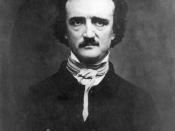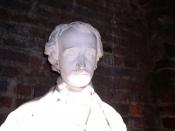Inescapable Truth: An Analysis
of "The Tell-Tale Heart"
Although during the first few lines of his story, Poe suggests that his nameless narrator is mad, a reader cannot fully assert this assumption until the madman explains his feelings toward the old man. Poe's first line even deviates the reader from a strong conclusion of insanity: "True!--nervous--very, very dreadfully nervous I had been and am; but why will you say that I am mad?" (Poe 36). However, only when one understands that while the madman murdered the old man, "[o]bject there was none. Passion there was none" (36), one can deduct the validity of the man's lunacy. "Even more convincingly than his earlier words," as an anonymous author explains, "(for we might possibly think that someone who claims to hear things in heaven and in hell is a religious mystic), [the madman's] preparations reveal him to be mad" ("By Lantern Light" 766).
His subtle moves and extreme caution do not depict a sane character as the madman believes, as it is common understanding that certain psychological disorders are characterized by an absurd extent of concern. Again, only through this connection can one be convinced of the madness lurking within the protagonist's mind.
Yet the irony of the story truly comes to form once one realizes the unreliability of the first person narrator--a technique Poe used to achieve maximum efficiency in the shock value of "The Tell-Tale Heart." His meticulous preparations are not the only factor pointing to this untrustworthiness; his belief of omniscience, or in this case, his belief that he knows exactly what the old man thinks, also does:
I knew what the old man felt, and pitied him, although I chuckled at heart. I knew that he had been lying awake ever since the first...


